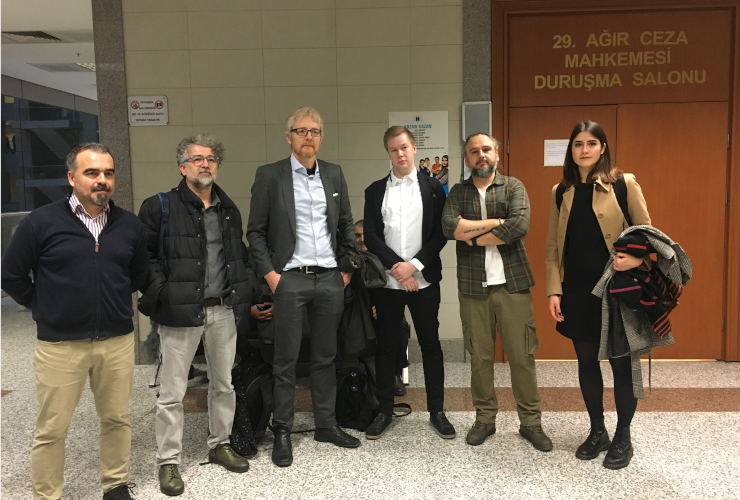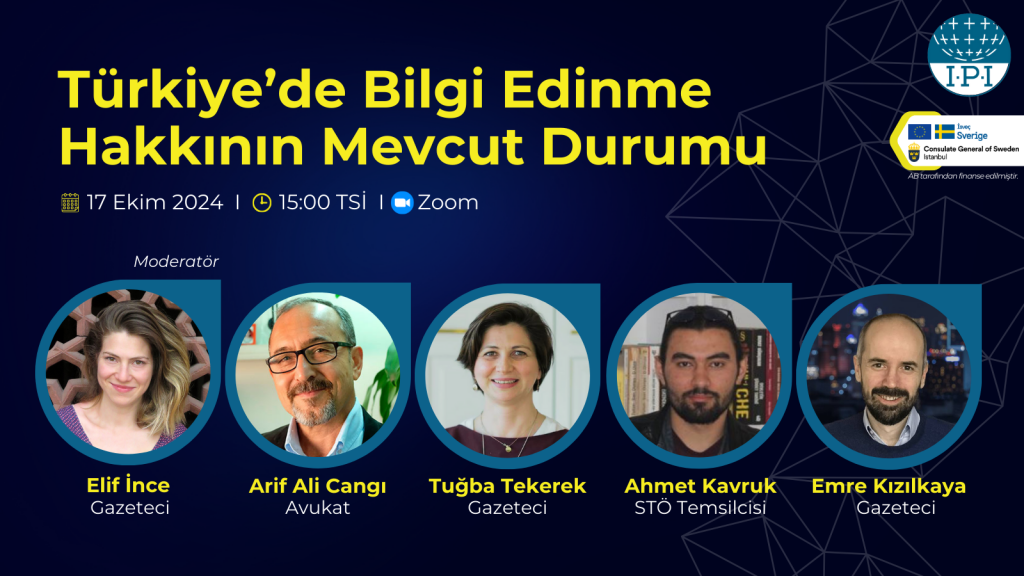On February 6, an International Press Institute (IPI) delegation spent a day in Istanbul’s Justice Palace to monitor the so-called RedHack trial involving a group of journalists who reported in September 2016 on leaked e-mails from former Turkish Energy Minister Berat Albayrak, who also happens to be the son-in-law of President Recep Tayyip Erdoğan. The case reflects the absurdity and arbitrariness of the country’s judicial system.
Prosecuted for being added to a Twitter group
The case against six journalists of various media outlets, Ömer Çelik, Tunca Öğreten, Mahir Kanaat, Derya Okatan, Eray Sargın and Metin Yoksu, has been ongoing for three years, and the February hearing was already the ninth. All six defendants were detained in December 2016. Çelik, Öğreten, Kanaat were arrested and spent over 300 days in pre-trial detention, while the others were released after 24 hours in custody.
Three of the journalists – Sargın, Öğreten and Kanaat – were present at the hearing on February 6, as well as six lawyers. The defendants demanded that the court arrive at a final verdict and called for their travel bans to be lifted, arguing that they have attended every hearing thus far and therefore posed no flight risk. As for the prosecution, they did not present any new evidence or make any comments to advance their case during the hearing.
At the centre of the trial is the fact that the journalists had been tagged into a direct-messaging Twitter group set up by an alleged member of RedHack, a Turkish Marxist-Leninist hacker group founded in 1997. The members of the Twitter group, which included hackers as well as journalists, were given access to e-mails from Albayrak, who is currently Turkey’s finance minister. The journalists then reported on those e-mails in their newspapers, which consisted of Albayrak’s correspondence with politicians, businessmen and family members.
Among other issues, the emails included an exchange on Albayrak’s alleged involvement in a private company called Powertrans, which reportedly imported oil from ISIS-controlled regions in Syria. The emails also suggested that Albayrak took part in attempts to control the press through social media campaigns following the Gezi Park protests in 2013.
For their reporting on the leaked emails, the journalists have been charged with, among other things, membership of a terrorist organization, spreading terrorist propaganda, intercepting information systems, revealing state secrets and obtaining and revealing personal data. The journalists are accused of being affiliated with DHKP-C, a revolutionary leftist militant group listed as a terrorist organization by the Turkish government.
The charges ignore the fact that journalists have a fundamental right to report on information in the public interest, regardless of the source, including when such information is leaked to them.
Initially, the defendants included another journalist, Deniz Yücel, a dual German-Turkish citizen, but his case was separated in the early stages of the process. Yücel, who was held in pretrial detention for over a year, was prosecuted on separate charges of spreading terrorist propaganda and inciting public hatred. Furthermore, although several other news outlets published articles about the leaked e-mails, only these six journalists face prosecution following a complaint by Albayrak.
Key witness’s identity still in the dark
During the February 6 hearing, the defendants argued that the prosecution had failed to provide any concrete evidence that they were members of a terrorist organization, let alone that they had spread terrorist propaganda.
Defendant Sargın called for the court to issue a final decision in this case and to return their computers, which had been confiscated by the authorities.
Journalist Öğreten took the stand to say that their articles were factually accurate, that they concerned a private company and were based on information in a private email account, and yet they are charged with the crime of revealing state secrets. Furthermore, he added that the e-mails were sent to the journalists without their solicitation, and they had no part in obtaining them.
The third defendant, Kanaat, demanded that the prosecution explain why they had brought these particular charges without any evidence, adding that nobody could engage in journalism if the state prosecutes them for their work.
A major issue in the case is an anonymous “whistleblower”, who allegedly is a member of RedHack and established the Twitter group but then sent an email to the police in Ankara naming seven journalists including Deniz Yücel, as members of DHKP-C. However, this individual has not been identified and his or her identify is reportedly also unknown to the Ankara police. During the February 6 hearing, defence lawyers underscored the authorities’ failure to investigate and identify the person and called on the judges to demand the police identify the “whistleblower” in order to compel him or her to testify.
The absence of this key witness creates a huge hole in the prosecutors’ case, considering that the whole prosecution is based on this person’s email. But the judges rejected the defence lawyers’ request stating that there is an ongoing investigation but there are no suspects yet identified.
Opaque reasonings and disappointing decisions
The defendants’ lawyers also called for each defendant’s case to be evaluated independently and for the court to review the original indictment in Deniz Yücel’s case. The defence lawyers stated that Yücel’s case plays an essential role in understanding the nature of this trial. Yücel has been released previously and allowed to return to Germany from where he is conducting his defence.
The court adjourned for about 20 minutes following the statements from the defendants and their lawyers. After filing back into the courtroom, the judges announced that two of the six travel defendants, Derya Okatan and Eray Sargın, would have their travel bans lifted, while the judicial control measures of the others were maintained. No explanation for the different treatment was provided, further adding to the sense of arbitrary justice. The court also accepted the defence lawyers’ request to re-examine Yücel‘s case file. The date of the next hearing was set for June 25.
Justice as the basis of the state
The RedHack hearing, as so many others in Turkey, reveals a justice system that is being used to harass critical journalists. Defendants can spend years attending hearing after hearing, waiting for a judgement, sometimes held in custody, and if not then usually under a travel ban or other form of judicial control. The weakness of the evidence and the blatantly absurd nature of the charges reinforce the sense of a politically captured justice system.
All of this fosters an atmosphere of self-censorship. Journalists targeted for their reporting inevitably feel pressure to avoid subjects and topics that might draw the ire of the state.
Taking these factors and strategies into account, the phrase so grandiosely crafted into the courtrooms and other parts of the massive Justice Palace, “Adalet Mülkün Temelidir” (Justice is the basis of the state), rings hollow at best and Orwellian at worst.



